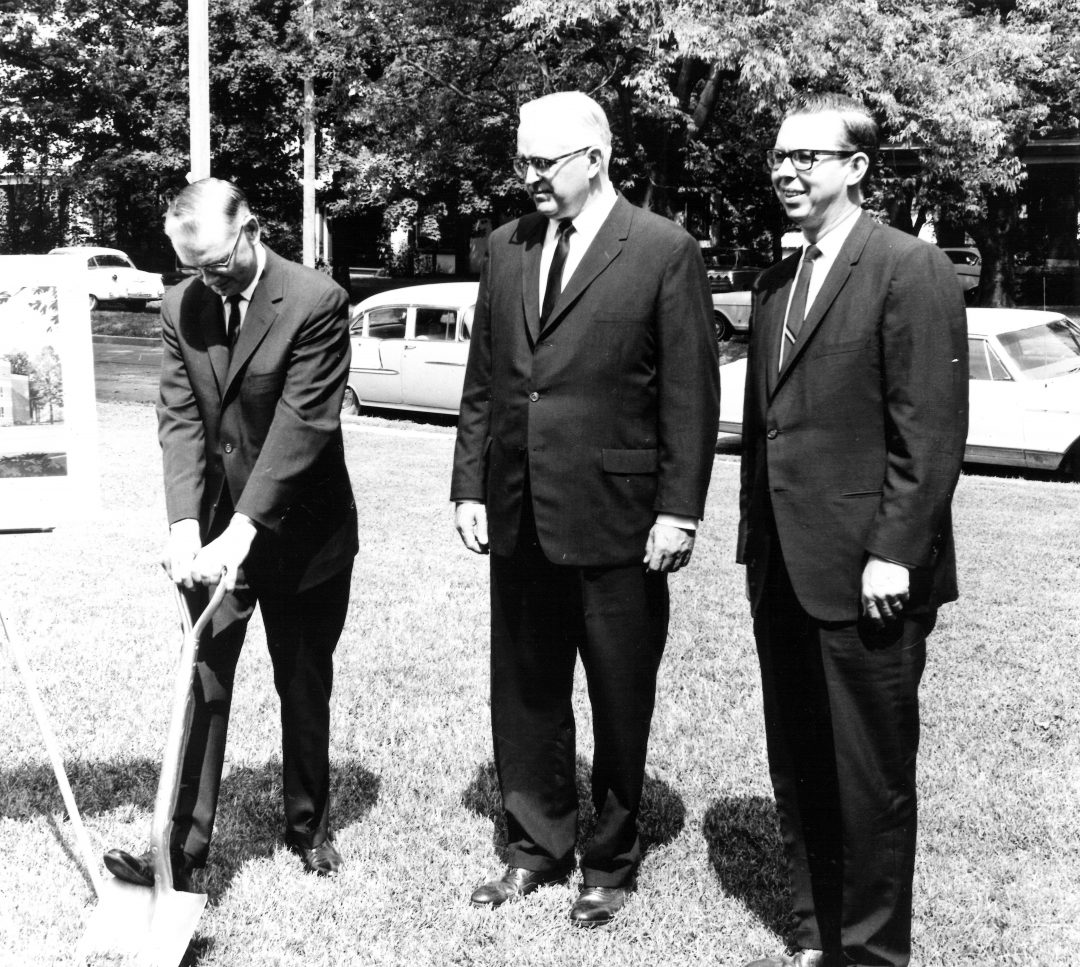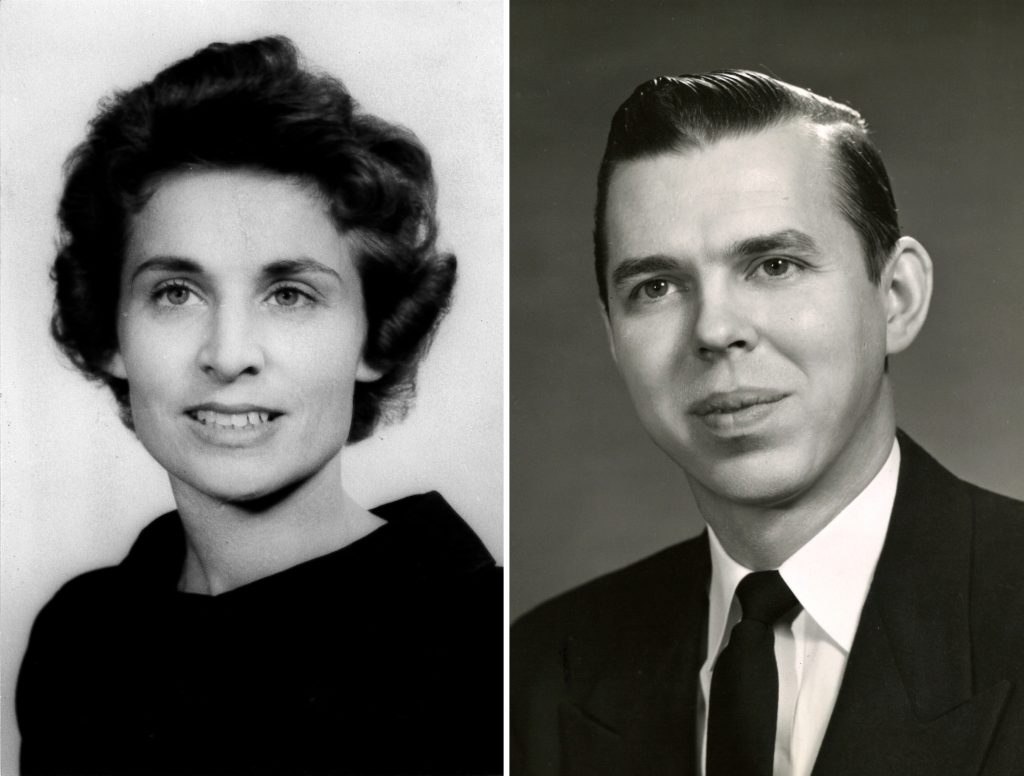Honoring Charles and Laura Thigpen’s Commitment to Excellence
[Adapted by permission from The Helwys Society Forum]
In April 2015, I was privileged to spend two days with Charles and Laura Thigpen in their beautiful Georgia home as I interviewed them about their time at Welch College. During my visit, we covered everything from institutional planning to course work. That interview only deepened my appreciation for this couple. The Thigpens are committed to giving their best to God in everything they do, always striving for excellence. This emphasis is evident in their lives and in their work at Welch College, where they tried their best to instill an appreciation for the good and the beautiful.
The Path to Free Will Baptist Bible College
Charles Thigpen and Laura Coker graduated from Bob Jones College (now university) in 1947. Charles earned a B.A. in Bible and English, while Laura’s degree was in speech and English. Their years at the college were formative for both of them, encouraging a life of excellence and appreciation for high culture, including art, drama, literature, and music. Laura recalled that this reinforced and expanded on the cultural heritage she received during her childhood in rural South Carolina.
After graduation, the couple married and moved to Tuscaloosa, Alabama, where Charles had pastored a Southern Methodist church during his senior year at BJC. Once there, the couple saw many come to Christ under their ministry. During this time, they also worked with young people and felt God leading them further in that direction.
This calling was confirmed a year later when L.C. Johnson (pictured above, middle, with Charles Thigpen, right, at the groundbreaking on the Johnson Academic Building) sent them a telegraph asking if they would consider teaching English, Bible, and Christian education courses at a small Bible college in Nashville, Tennessee. After meeting with Johnson and praying seriously about the opportunity, Charles and Laura accepted the positions at Welch College (then Free Will Baptist Bible College).
The couple moved to Nashville in 1948. When they arrived, they taught a wide range of courses, and Charles found himself heavily involved in administration. In 1953, the Thigpens left the college to pastor Highland Park FWB Church in Michigan. However, four years later they returned to the college, where they remained until 1991.[1]
The Thigpens maintain that Johnson established the overall character and emphasis of the college. However, they reinforced the work he began and helped expand the school into new directions. Part of this work involved cultivating in students a concern for beauty and excellence, incorporating these qualities into the academic and social lives of the students.
Demand for Excellence
Charles Thigpen filled a variety of important roles at Free Will Baptist Bible College, including professor, registrar, dean of students, president, and chancellor. While his work in each field is worth studying, consider his stint as academic dean. He held this position over 20 years (1957-79). As academic dean, he oversaw the academic and social lives of students, as well as curriculum development and faculty hiring.
Dr. Thigpen always looked for ways to expand the curriculum. He thought the female students at the college ought to be prepared for acquiring good paying jobs and pushed for the college to expand into teacher education (TE). He worked tirelessly to develop the program, ensuring the state of Tennessee would accept graduates in the public-school system. Public schools provided good incomes for women and opened doors for reaching unsaved children.
However, expanding the college curriculum did not mean the college was abandoning its purpose. Rather, the school was enhancing its ability to train Christian workers.[2] In his 1979 inaugural address, Dr. Thigpen emphasized the theistic worldview that undergirded everything taught at the college. He stated the Bible was the “integrating principle for the entire curriculum.”[3] Beyond providing biblically-based education, he argued that 1 Corinthians 10:31 required Christians to approach each subject and class period with excellence.
He wanted the college be excellent in every way, including administration. As academic dean, he supervised the work of teachers and hired new employees. He was always searching for potential professors to help develop and expand the school’s ability to train students. He hired Laura Belle Barnard and Laverne Miley to teach missions and William Henry Oliver to lead the fledgling teacher education program.
His responsibilities also included faculty remuneration. Though he rarely critiqued his alma mater, Dr. Thigpen felt that Bob Jones College did not pay its faculty enough. Therefore, he tried his best to make sure Welch College paid its employees as much as possible. In addition, he made sure women were paid on the same scale as men with the same qualifications because he thought it wrong to do otherwise.
Excellence was a touchstone for Charles Thigpen. For him, doing all things to the glory of God extended even to the college’s administration.
Pursuit of the Good and the Beautiful
When Laura Thigpen graduated from college in 1947, the administration invited her to return as a speech teacher the following year. However, because she and Charles thought the remuneration was not sufficient, she declined the offer. She was nonetheless eager for opportunities to teach. When L.C. Johnson approached her and Charles about coming to Nashville, she was elated.
Laura’s influence was felt immediately. Prior to her arrival, English literature courses focused on “literary personages and works most related to the history of the Christian Church and to the history of the English Bible.”[4] In these early courses, literature’s importance was limited to its Christian content. The beauty and excellence of the work wasn’t a central concern.
Under Laura’s instruction, literature was studied, not only for content, but for aesthetic excellence. The college catalog description of her 1948-49 World Literature course highlights this change: “An outline study of some of the world masterpieces with a view of creating taste for and interest in the minds of the students for gaining a knowledge of the worthwhile literary gems of ancient medieval and modern masters.”[5]
Mrs. Thigpen’s approach to literature shifted from engaging art merely for Christian content. Instead, literature was also important for cultivating aesthetic appreciation and cultural awareness.
Beyond teaching speech and literature, Laura directed two, three-act plays each year. Early plays were performed under a tent next to Davidson Hall, because there was no auditorium. Laura worked around these difficulties to create the most excellent production possible. For example, she was determined to have a light dimmer for her stage. After working on the problem with her light man Billy Melvin, they discovered that by dipping the electrical cord for the light into a bowl of salt water they could sufficiently dim the light to meet their needs. It was a dangerous but creative solution.
Once a month, she directed a service on Sunday afternoon, inviting visitors from the area to come. These programs incorporated music, speech, and drama to teach biblical subjects. She taught students to evangelize and edify through drama that was excellent in quality. Out of her work in drama, Laura developed the Evangels travel team. She intended the group to perform dramatic presentations easily adapted to local church settings, in hopes they would encourage churches to perform their own dramas with excellence.
Laura Thigpen’s influence on the development of Welch College cannot be overstated. She was a demanding professor who expected the best from her students. Her courses were designed to stretch students and introduce them to new worlds. In the process, she cultivated within them an appreciation for the good and the beautiful, to be pursued with excellence. She expected nothing less from the creative output of the school. Dramatic productions were not simply about evangelism, but were works of art to be performed to the glory of God.
The Thigpens were a unique couple. Their commitment to excellence is an act of obedience to God. For them, bringing Him glory in all things meant their work as educators must be excellent. Charles Thigpen applied this to the college administration for decades, helping to build a strong college that taught every subject from a Christian worldview.
Laura applied the Christian worldview in her courses, emphasizing the good, excellent, and beautiful in literature and drama. Both serve as wonderful examples for me and for all who had the privilege to know them.
About the writer: Phillip T. Morgan lives with his wife Megan, and their three children Isaiah, Julia, and Deborah on a small farm in Robertson County, Tennessee. They are actively involved in the ministries of Heads Free Will Baptist Church and their local association. Phillip serves as the History Program coordinator at Welch College. He is currently pursuing Ph.D. studies in history at Kansas State University and holds degrees from Middle Tennessee State University (M.A., History) and Welch College (B.S., Music Performance, Biblical Studies).
He has coauthored two books: Light and Truth: A Seventy-five Year Pictorial History of Welch College (Welch College Press, 2018) with J. Matthew Pinson and The Cumberland Association: Celebrating 175 Years of Leadership, Ministry and Service (RHM, 2018) with Roy W. Harris. He also contributed a chapter in The Promise of Arminian Theology (Randall House Academic, 2016) and has written a number of popular articles in ONE Magazine and the Helwys Society Forum His interests include animal husbandry, economics, gardening, philosophy, politics, theology, and southern agrarianism.
[1] For further biographical information on the Thigpens, see Jackson Watts’s excellent sketch of their lives in ONE Magazine.
[2] See Free Will Baptist Bible College Charter.
[3] Charles Thigpen, “The College Drama,” presented October 2, 1979, Nashville, TN, in Free Will Baptist Bible College Bulletin 27, no. 5 (September/October, 1979).
[4] Free Will Baptist Bible College Catalog: 1943-1944 (Nashville, TN: Free Will Baptist Bible College, 1943), 10.
[5] Free Will Baptist Bible College Catalog: 1948-1949 (Nashville, TN: Free Will Baptist Bible College, 1948), 24.


